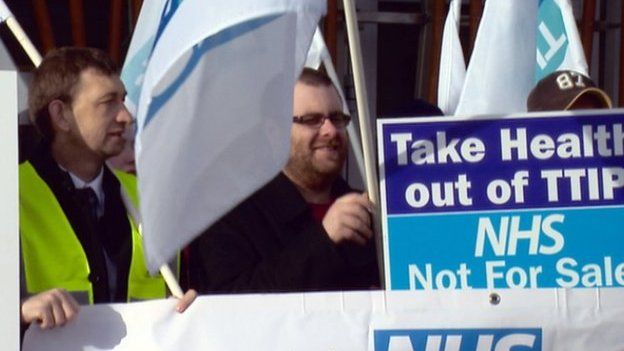MPs seek more detail on controversial US-EU trade talks
- Published

Trade talks between the US and European Union have been marked by "dog whistle" politics, a group of MPs has warned.
The Business Select Committee said debate over the Transatlantic Trade and Investment Partnership (TTIP) had been over-simplified and misrepresented.
The committee said that attitudes must change if progress is to be made.
The proposed free trade deal faces opposition across Europe, with UK campaigners alleging it could open the NHS to privatisation of services.
In its final report of the current Parliament, the committee called on the Government to stop saying the deal could be worth £100bn to the EU and come up instead with a "comprehensive assessment" of the economic benefits and risks for different sectors.
The MPs also want ministers to make an "unequivocal" statement that public services will be protected.
EU and US negotiators hope to agree the partnership by the end of the year. But the MPs said too much detail remained "beyond public scrutiny".
'Not convinced'
The report said: "TTIP has the potential to have a significant impact on the UK economy, on jobs and on public services, but the debate on it so far has been marked by too much 'dog whistle' politics on each side."
A highly controversial part of TTIP involves dispute resolution, allowing companies to take a government to an international court. Critics say an investor-state dispute settlement (ISDS) would benefit corporations at the expense of democracy.
Labour MP Adrian Bailey, who chairs the committee, said: "We are not convinced the case has been made for the inclusion of ISDS clauses and we urge the Government to set out a clear statement guaranteeing the protection of public services at present, and the right to expand them in the future, is set out in any ISDS provisions.
Mr Bailey said there had not been sufficient examination of the potential benefits of TTIP: "The Government needs to come up with a sector-by-sector analysis."
- Published26 February 2015
- Published18 December 2014